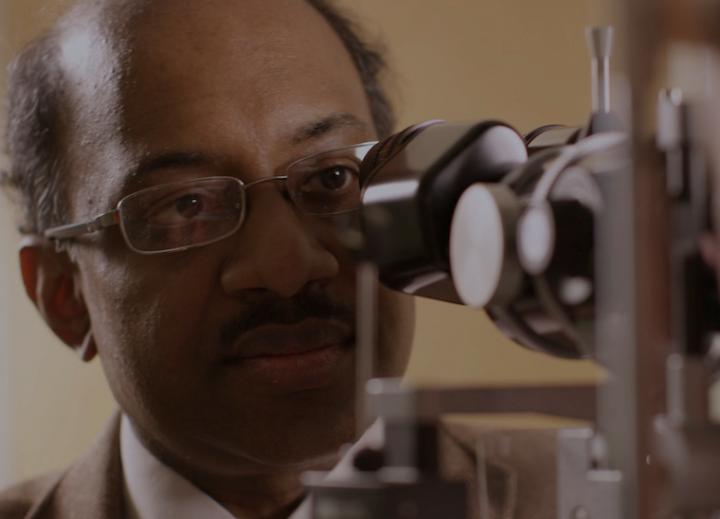
Credit: UVA Health
Scientists have identified a group of drugs that may help stop a leading cause of vision loss after making an unexpected discovery that overturns a fundamental belief about DNA.
The drugs, known as Nucleoside Reverse Transcriptase Inhibitors, or NRTIs, are commonly used to treat HIV. The new discovery suggests that they may be useful against dry macular degeneration as well, even though a virus does not cause that sight-stealing condition.
A review of four different health insurance databases suggests that people taking these drugs have significantly reduced risk of developing dry macular degeneration, a condition that affects millions of Americans.
“We are extremely excited that the reduced risk was reproduced in all the databases, each with millions of patients,” said Jayakrishna Ambati, MD, a top macular degeneration researcher at the University of Virginia School of Medicine. “This finding provides real hope in developing the first treatment for this blinding disease.”
Targeting Macular Degeneration
The new discovery comes from Ambati; Fred H. Gage, PhD, of the Salk Institute for Biological Studies; and collaborators around the world. The work rewrites our understanding of DNA, revealing for the first time that it can be manufactured in the cytoplasm of our cells, outside the cell nucleus that is home to our genetic material.
The buildup of a certain type of DNA in the cytoplasm, Alu, contributes to macular degeneration, the researchers found. This buildup appears to kill off an important layer of cells that nourishes the retina’s visual cells.
Based on this discovery, the researchers decided to look at drugs that block the production of this DNA, to see if they might help prevent vision loss. They analyzed multiple U.S. health insurance databases – encompassing more than 100 million patients over two decades – and found that people taking NRTIs were almost 40% less likely to develop dry macular degeneration.
The researchers are urging further study to determine if these drugs or safer derivatives known as Kamuvudines, both of which block a key inflammatory pathway, could help prevent vision loss from dry macular degeneration.
“A clinical trial of these inflammasome-inhibiting drugs is now warranted,” said Ambati, the founding director of UVA’s Center for Advanced Vision Science. “It’s also fascinating how uncovering the intricate biology of genetics and combining it with big data archeology can propel insights into new medicines.”
Ambati, of UVA’s Department of Ophthalmology, previously determined that NRTIs may help prevent diabetes as well.
###
Findings Published
The researchers have published their findings in the scientific journal PNAS. The research team consisted of Shinichi Fukuda, Akhil Varshney, Benjamin J. Fowler, Shao-bin Wang, Siddharth Narendran, Kameshwari Ambati, Tetsuhiro Yasuma, Joseph Magagnoli, Hannah Leung, Shuichiro Hirahara, Yosuke Nagasaka, Reo Yasuma, Ivana Apicella, Felipe Pereira, Ryan D. Makin, Eamonn Magner, Xinan Liu, Jian Sun, Mo Wang, Kirstie Baker, Kenneth M. Marion, Xiwen Huang, Elmira Baghdasaryan, Meenakshi Ambati, Vidya L. Ambati, Akshat Pandey, Lekha Pandya, Tammy Cummings, Daipayan Banerjee, Peirong Huang, Praveen Yerramothu, Genrich V. Tolstonog, Ulrike Held, Jennifer A. Erwin, Apua C.M. Paquola, Joseph R. Herdy, Yuichiro Ogura, Hiroko Terasaki, Tetsuro Oshika, Shaban Darwish, Ramendra K. Singh, Saghar Mozaffari, Deepak Bhattarai, Kyung Bo Kim, James W. Hardin, Charles L. Bennett, David R. Hinton, Timothy E. Hanson, Christian Röver, Keykavous Parang, Nagaraj Kerur, Jinze Liu, Brian C. Werner, S. Scott Sutton, Srinivas R. Sadda, Gerald G. Schumann, Bradley D. Gelfand, Fred H. Gage and Jayakrishna Ambati.
Jayakrishna Ambati is a co-founder of Inflammasome Therapeutics, iVeena Holdings, iVeena Delivery Systems and DiceRx; a full list of the authors’ disclosures is included in the paper.
The research was supported by UVA’s Strategic Investment Fund, the National Institutes of Health Director’s Pioneer Award, the National Institutes of Health’s National Eye Institute and many other generous contributors. A full list is included in the paper.
To keep up with the latest medical research news from UVA, subscribe to the Making of Medicine blog at http://makingofmedicine.
Media Contact
Josh Barney
[email protected]




